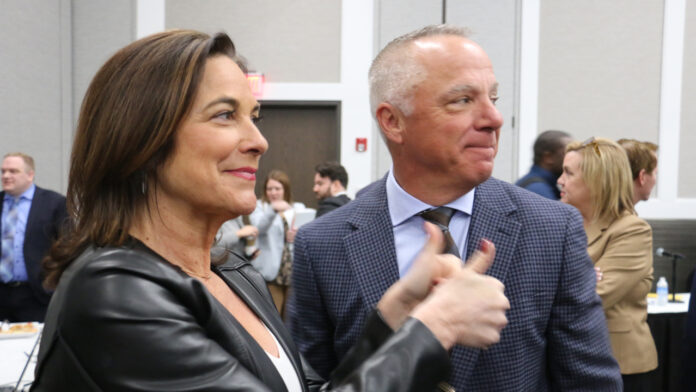
The third time is the charm for supporters and developers’ efforts to bring a casino to Cedar Rapids.
By a 4-1 margin Thursday morning, the Iowa Racing and Gaming Commission (IRGC) voted to approve a gaming license for a Cedar Rapids casino.
And developers are moving quickly. A casino groundbreaking ceremony construction is set for 11 a.m. Friday for the $275 million Cedar Crossing Casino and Entertainment Center, which will now be built on vacant land between F and I avenues NW and First and Fifth streets NW.
Construction is set to be completed in the latter half of 2027, though representatives of Peninsula Pacific Entertainment, the company that will develop and operate Cedar Crossing, declined to specify a completion date.
The decision marks a key turning point for the IRGC, which had twice rejected casino proposals for Linn County, in 2014 and 2017, after commissioners largely sided with opponents who argued the state’s gaming market was saturated and a new Linn County casino would glean market share at the expense of other casinos.
Linn County voters approved a casino referendum in 2013, and a second referendum approved by voters in November 2021 allowed developers to seek a casino license for the county in perpetuity.
Commissioners said they based their vote on the impact of the new casino on the Iowa gaming market overall. While acknowledging that Cedar Crossing will “cannibalize” revenue from other Eastern Iowa casinos, they said that on balance, the project’s benefits far outweighed that single factor.
However, a potential legal challenge to the license approval still looms.
A petition seeking to block the commission’s consideration of a Linn County gaming license was turned away by the IRGC in November.
The petition, filed Nov. 8 by the Riverboat Casino and Golf Resort and the Washington County Riverboat Foundation, claimed that the wording of the 2021 Linn County ballot measure that permanently authorized gaming in Linn County was faulty under Iowa state code and that, as a result, the IRGC “lacks authority to issue a gambling games license in Linn County.”
The commission voted 4-1 to decline to consider the petition, after attorneys on both sides of the petitions presented arguments for their cases.
But Dan Kehl, president of Elite Casino Gaming, the operator of the Riverside Casino, implied in a statement that the commission’s decision on that petition may be challenged legally.
“We are disappointed by the commission’s decision today,” Mr. Kehl said. “We appreciate the time and effort the commission and staff put into this, but we do have questions and concerns as we still believe the referendum requirement has not been met and are reviewing our next best steps.”
Supporters celebrate
A number of casino supporters spoke after the commission’s meeting, including Cedar Rapids Mayor Tiffany O’Donnell; Jonathan Swain, president of Peninsula Pacific Entertainment, the casino’s developer; and Anne Parmley, board president of the Linn County Gaming Association, the group that will distribute a portion of casino profits to nonprofit agencies.
“This is a cataclysmic moment for Cedar Rapids and Linn County, and I feel all of the emotion,” Ms. O’Donnell said. “I’m just so proud of the efforts and of this commission.”
Later, Ms. O’Donnell clarified her statement, indicating she intended to refer to the moment as “transformative” rather than “cataclysmic.”
Ms. O’Donnell said she felt commissioners based their vote on statewide interests, not just those of Cedar Rapids.
“As a commission, they acknowledged that that was their role,” she said. “It wasn’t just about one casino operator. It wasn’t about one community. They had to keep an eye on what’s best for the state. And I think that’s the data showed that it would be a net gain for the state.”
Ms. O’Donnell said the commission didn’t seem to dwell on the issue of revenue “cannibalization.”
“They used the words ‘market shift,’ which I believe is exactly what we will see,” she said. “But that doesn’t mean that it’s a zero-sum game. As we heard here today from existing casinos, there are a lot of renovations happening at casinos across the state. I like to think that our application may have had something to do with that, proving to me that competition makes everybody better. So while some casinos may see a dip initially, I firmly believe, and history, shows us, ultimately, Iowa gaming is better because of this. Iowa gaming in general will be more relevant than ever, more innovative than ever, because of this latest license and project.”
Ms. O’Donnell had previously described the Cedar Rapids casino quest as a “David vs. Goliath” situation, and she doubled down on that assertion Thursday.
“David got his shot, and the story ended as it should,” she said. “But to say that we were underdogs in this would be an understatement. This was a high mountain to climb, and we knew that we were not a sure bet. Most people would call us a long shot, and yet, here we are, and I credit the commission for taking politics, taking emotion, out of this decision, and leaning on the facts and the multiple studies that they had before them.”
She also noted the groups that were actively speaking against a Cedar Rapids casino, including state lawmakers.
We have had the state legislature against us, issuing moratoriums and threatening to issue moratoriums,” she said. “We had casino operators throwing millions of dollars of opposition, into ads and text messages. We were up against an extremely formidable opponent. When you have a state government that has so much power to stop the project, and exercised that in the past, I don’t know how you get any more underdog than that? And to the Legislature’s credit, as the commissioners mentioned, they let the process play out. We did get our shot, and we’re rewarded today.”
Ms. O’Donnell said she saw her role in the casino campaign as that of a messenger.
“My passion for this project really was to be the recognition that I’m the voice at the table,” she said. “I get the seat at the table, and it’s my job to be that voice for voters who overwhelmingly said they wanted this. And we delivered today. I say we, because this was an army of people. It was Cedar Rapids and Linn County residents reaching out. It was nonprofits standing up. It was business owners standing up, the investors putting up the capital. This was a Herculean effort by a lot of people from a lot of different backgrounds, and I’m so excited for all of them.”
Mr. Swain noted that the approval of Cedar Crossing, for Peninsula Pacific Entertainment, has been 12 years in the making.
“It was very emotional to hear the votes, just an overwhelming feeling of gratitude,” he said. “We had an opportunity to present the best project that we’ve ever put forward. The commissioners listened to us objectively, and we’re very excited about the decision.”
Mr. Swain attributed the successful casino effort to three primary factors, as differentiated from the unsuccessful 2017 proposal.
“It’s the amenities, the population growth and the revenue growth that’s happened since 2017,” he said. “Every time we did one of these plans, we always re-evaluated and tried to improve it.”
Mr. Swain thanked Cedar Rapids supporters for their efforts, including “those that voted for the referendums, our 67 local investors – Drew Skogman, Steve Gray, the original thought (leaders) behind this whole project. There’s just a whole lot of appreciation for Linn County, and we’re going to make them very proud.”

Ms. Parmley was visibly emotional after the meeting.
“It’s a lot of hard work,” she said. “It’s a lot of late nights, it’s a lot of days doing your paying job on the weekend to make up for the time that you’re spending with these folks. You learn so much about the needs of the community and what the nonprofits could do with this kind of funding, and the impact it can make in our community. You see firsthand, going to all these IRGC meetings over four years, the impact that the communities who have casinos have had, whether it’s infrastructure in their communities, amenities, or the nonprofit support. Today was a new beginning for Linn County. It’s going to do great things, and I can’t wait to realize them.”
Ms. Parmley also laid out the next steps from the LCGA’s perspective.
“The big job that the Linn County Gaming Association has, between now and when the casino is built, is to build out our processes, how we will go about accepting grants and awarding funds, so we can have a transparent process that can embrace the community’s needs and understand those needs so that we can best use those dollars to help people who need the help,” she said. “To support the arts, to support human services, to support education, all the things that we can do with this money to make our nonprofit network and ecosystem stronger and make our community better.”
“There’s not many times in my life that I’ve been involved in something like this,” she said. “This is joy and excitement for what’s to come. This is a new beginning.”
Iowa State Rep. Sami Scheetz also celebrated the commission’s decision.
““This is a huge win for Cedar Rapids and for our entire state,” said Rep. Scheetz. “The people of Linn County have twice voted in favor of this project, and today, the IRGC rightfully upheld their voice. This decision means good-paying jobs, increased tourism, and a major boost to local businesses—not to mention millions in new revenue that will go directly to supporting Iowa nonprofits.”
Commissioners explain their votes
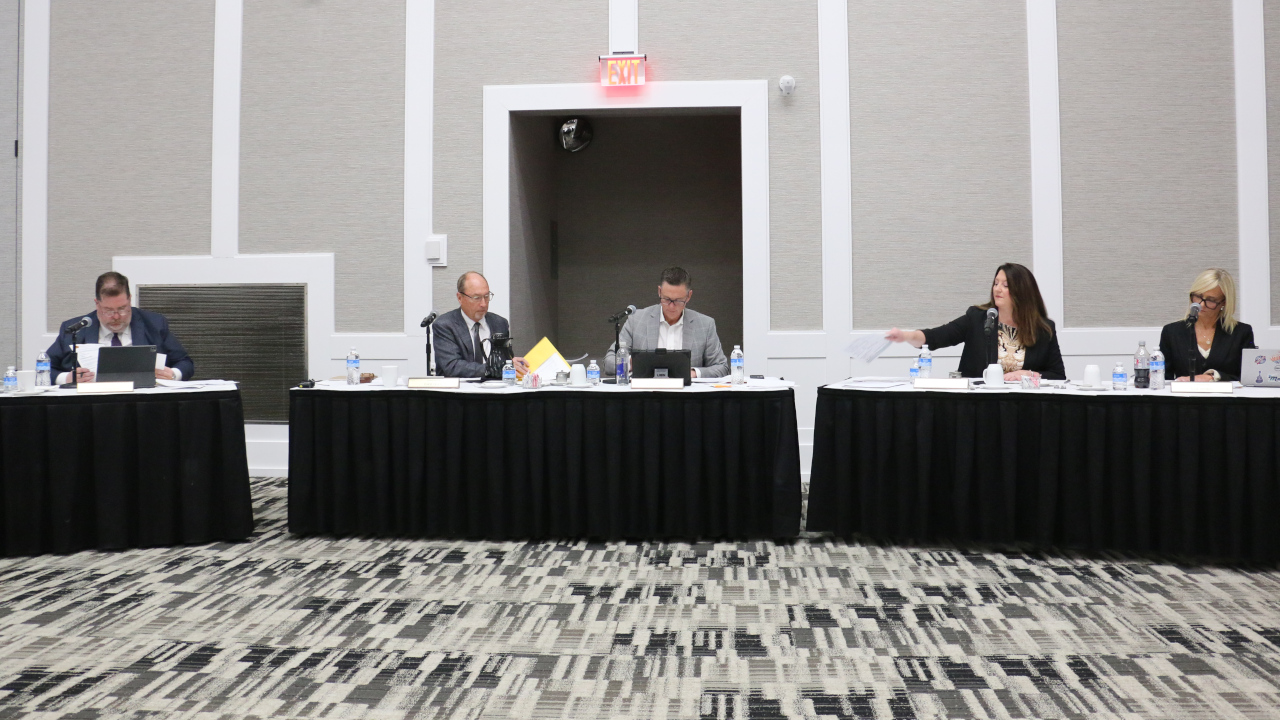
The commission voted 4-1 to approve the license, with commissioners Julie Andres of Okoboji, Amy Burkhart of Burlington, Mark Campbell of Otho and chair Daryl Olsen of Audubon voting in favor of the license and commissioner Alan Ostergren of Altoona voting against it.
Before the votes were cast, IRGC commissioner Tina Eick outlined the criteria prescribed by state statute for considering new casino licenses, including compliance with regulations, gaming integrity, economic impact and development, efficient and safe operation of the facility, community support, and “other factors that may arise in the circumstances presented by a particular application.”
All five commission members spoke about their reasons for voting as they did. To a member, they expressed gratitude for the extensive input they received, from both supporters and opponents.
Ms. Andres acknowledged the difficulty of the commission’s decision.
“There’s no way we’re going to make you all happy today,” she said. “art of the reason, I believe, is that we have a high quality standard in Iowa, and the nature of our existing casinos show that. That makes the concept of cannibalization hard to accept as we balance what we expect out of our licensee against how many casinos there ought to be in a market. There comes a time when more is not more.”
However, she said the studies conducted on the commission’s behalf weighed the debate in Cedar Rapids’ favor, noting that both studies projected a net gain of $60 million to $64 million in statewide gaming revenue.
“You’ve heard about the criteria we can consider in this decision,” she said. “The Cedar Rapids project meets and exceeds a lot of them … I don’t think a project that is desired by a local community gives that community an opportunity to thrive and develop, meets and even exceeds our standards for quality of design and amenities, provides a unique and differentiated product in the market, and provides a net gain of revenues to our state should be denied.”
Ms. Burkhart cited her career as a marketer as a factor in her decision.
“It flies in the face of my professional integrity to say that this would not be a green light project,” she said. “I would not look at this for a client that I represent and say that this doesn’t have a good chance to succeed.”
She noted that she lives closest of all the commissioners to the area impacted by a new casino.
“I have been contacted by numerous individuals who I greatly respect and admire, that are in the business community where I live, work and play, and I understand that any decision I make today has an opportunity to impact their lives and financial well being,” she said. “But at the end of the day, I have to ask myself, what is my job and what is my role here? Unfortunately or fortunately, this commission is not laid out in a way in which people are appointed to represent a specific geographical area. So for my personal integrity, I have to look at that I am in Iowan today and not representing a particular area, and looking at the state of Iowa, all I see is net gain … the net gain to our state is significant.”
Mr. Campbell said that after careful consideration of the studies and data, he believed the state’s gaming market “has the availability to support this project.”
“These studies also indicate that there will be hardship,” he said. “However, it’s important to note that every gaming license issued in Iowa has experienced some degree of cannibalization or market share redistribution, yet the industry continues to thrive. It’s a reality that many licensees were aware of when they applied, fully understanding that temporary shifts might occur. Despite these shifts, Iowa gaming has remained robust and successful.
“I also fully understand the concern that this new license could potentially reduce funding for current qualified sponsored organizations,” he added. “However, I view this as a similar concern to market shift. While some funding may shift temporarily, the overall pool of QSO dollars will increase as a result of this new license. This growth in funds will ultimately benefit the broader community.”
Mr. Ostergren said he remains convinced that the commission doesn’t have the legal authority to issue a license, due to the petition submitted by Riverside Casino and the Washington County Development Group in November.
“The issue of the validity of the Linn County referendum, that we discussed at length two weeks ago, is still present, and that has not been resolved to my satisfaction,” he said.
Despite voting against the Linn County license, Mr. Ostergren said he was impressed with the overall quality of the project.
“I will confess I wasn’t personally looking forward to going to a big public forum in Cedar Rapids in November,” he said. “But I was really glad by the end of it. We heard from people all over the place, ad I thought almost everyone was sincere in their comments and passionate and believed in their community. It was gratifying to see so many people who were involved in so many nonprofits in all these different communities. That’s what makes America great, that we solve problems by people getting together and working cooperatively.”
He did note, however, that he was “offended” by comments from a representative of the Isle Casino in Waterloo.
“He asked us to think about looking in the mirror and how we would feel if we granted this license – an appeal to raw emotion,” he said. “I was offended by that as a commissioner. I thought it was terribly inappropriate. Nobody here is making a decision based on emotion. We’re making this decision based on what we see the facts are … Even though I personally disagree with the vote that my fellow commissioners are making this morning, I don’t think they’re making this decision based on emotion. I think they’re making it based on their honest assessment of what they see the facts are. They see it differently than I do, and that’s fine.”
He said according to his analysis, the new casino’s tax contribution to the state’s general fund will provide a benefit of “roughly 12-hundredths of a percentage point. I personally, would come down on not disrupting our existing operators to that extent, based on that negligible increase in revenues as a whole … I think we’re going to disrupt what is currently in existence too much for the benefits to the Linn County community, which I do think will be considerable.”
Mr. Olsen countered Mr. Ostergren’s assertion, saying that after consulting with legal counsel, he felt the commission had the authority to make a decision.
He pointed to the criteria the commission considers when reviewing new license applications, and said he had “no concern” that Cedar Crossing would fully comply with those criteria.
“Yes, there will be hardship,” he said. “That is the one negative to this entire to this project that I can look at, and that bothers me, but I can’t let one negative stand in the way of all the other positives.”
He noted that “other factors” also impacted his vote.
“If this was just another gaming facility, I’d be voting no,” he said. “But this provides so much more. It provides amenities, restaurants, a 1,500 person venue for entertainment, arts and culture center, STEM lab, and so much more. It’s unique, it provides much more than gaming, and that’s so important to me.”
He thanked Iowa legislators for allowing the commission to vote on the application and deciding not to impose a five-year moratorium on new licenses.
“I’d like to thank the Iowa legislators for trusting this commission, for allowing the process to proceed as I believe it was intended this commission all along. We do not legislate, but today we’re allowed to regulate.”
He compared the commission’s decision to their previous decisions to reject Cedar Rapids casino applications in 2014 and 2017.
“I think that would have voted no in 14 and 17, because all at that point in time it was was a casino, and this is much more,” he said. “So understanding there’s only one criteria that’s negative, but so many are positives.”
He also said he doesn’t feel the commission’s decision will open a “floodgate” of new license applications, further saturating the state’s gaming market.
“The last license was issued more than 10 years ago,” he said. “It’s been a long time. And Linn County makes sense to me. This makes sense, but to be honest, with the other locations to me don’t. I look today and say, where else could we look at? I’d love to start over. Wouldn’t be fun to just wipe everything clean and say we’re going to put them here, here, here and here, and they all make sense, but we don’t have that option. We have to look at what we have today, and how to look at what’s best for the future.”
Casino plans outlined

Developers and supporters first unveiled plans for a Linn County casino in Cedar Rapids, dubbed “Cedar Crossing,” in May 2022.
The casino will now be built on city-owned property between F and I avenues NW and First and Fifth streets NW. Most of that property was previously occupied by the Cooper’s Mill restaurant and Best Western Hotel before those facilities were demolished due to damages sustained in the 2008 flood, and the property was subsequently acquired by the city.
The city has designated the Cedar Rapids Development Group as their preferred casino developer.
Mr. Swain said in September 2024 that Cedar Crossing, projected to encompass 160,000 square feet and more than 1,100 on-site parking spaces, will feature three live entertainment spaces, including a 1,500-seat venue “that will host top-tier performances and events drawing visitors from across the state and beyond.”
The venue could also host sporting events, comedy shows, special events, festivals and trade shows.
“We want to draw people with entertainment, with hundreds of live performances a year,” said Mr. Swain, whose company has also developed other casinos across Iowa. “That is our experience in Sioux City, that is our experience in Dubuque. That tells us that that helps lift businesses downtown, especially hotels, bars and restaurants, bringing people to see our shows and have them stay overnight at a downtown hotel and visit businesses here. That’s what it’s all about. A high tide raises all boats.”
Mr. Swain outlined plans for three new restaurants at Cedar Crossing – Zach Johnson’s Clubhouse, developed with the PGA golfer and Cedar Rapids native, featuring steaks, chops and craft cocktails; World’s Fair, offering street foods such as Indian street tacos, Korean crispy chicken, Mediterranean wraps, crepes and churros; and the River’s Edge Smokehouse and Tap, with pub burgers, pulled pork, beef brisket and barbecued ribs.
He also introduced plans for a dedicated arts and cultural center, the first of its kind at an Iowa casino. The venue would feature rotating exhibits in partnership with the National Geographic Society, and would occasionally be transformed into a STEM (Science, Technology, Engineering and Mathematics) lab accessible to local students, as part of a partnership with 2020 Miss America Camille Schrier.
Casino application process
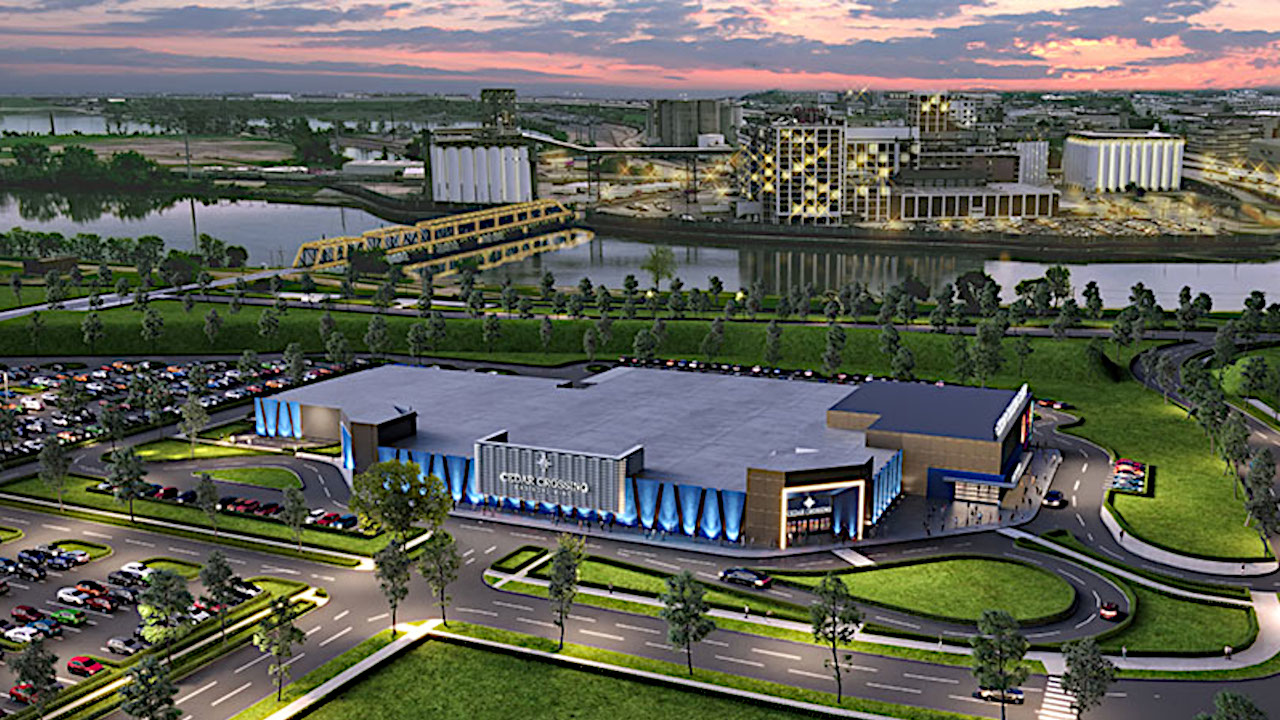
The door was opened for a new Linn County gaming license application after a two-year state gaming license moratorium imposed by the Iowa Legislature expired in June 2024, and the IRGC indicated it was willing to accept new license applications.
As a result, a formal license application was filed jointly in August by P2E, which will operate the proposed Cedar Crossing Casino, and the nonprofit Linn County Gaming Association.
Previously, the IRGC had twice rejected casino proposals for Linn County, in 2014 and 2017, after commissioners largely sided with opponents who argued the state’s gaming market was saturated and a new Linn County casino would “cannibalize” revenue from existing state-licensed casinos.
However, all five current IRGC members are newly-appointed since the 2017 decision.
Proponents also said the project would also provide new construction work for Cedar Rapids trades professionals, and in October 2021, the Cedar Crossing team signed a memorandum of understanding (MOU) with Cedar Rapids/Iowa City Building and Construction Trades Council. The MOU outlined the intention for CRDG to enter a project labor agreement once plans are finalized, contingent in part on receiving a gaming license from the IRGC.
Studies provide perspective on casino impact
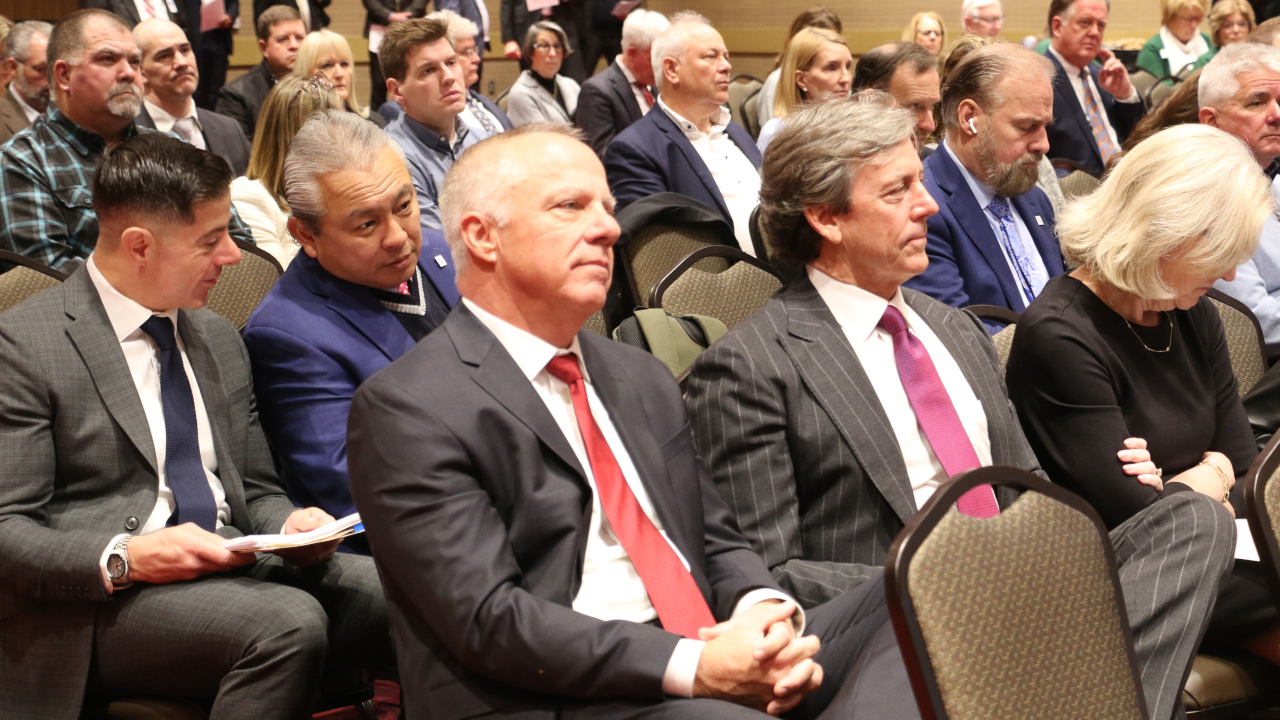
Several studies provided perspectives on a new Cedar Rapids casino, and its potential statewide impact.
An economic impact study by Decision Innovation Solutions, commissioned by P2E and released in January, projected a Cedar Crossing impact of $257 million during the construction phase and $183 million in the first year of operations. In total, the study projected $2.25 billion in total impact from construction through the first 10 years of casino operations.
And a study by Convergence Strategy Group, also commissioned by P2E, indicated that Cedar Crossing would generate $108 million in gaming revenue annually, $80.2 million of which would be new revenue for the state.
The study said casino construction will create the equivalent of 1,100 full-time jobs over its 18-month construction window, with over half that work going to Linn County residents. Construction would generate $303 million in additional spending in Iowa, including $102 million in wage earnings. Once operational, the casino would create 300 on-site jobs, with 224 more ancillary jobs in the community.
Projections also indicated the new casino will draw more than 1.1 million visitors to Cedar Rapids per year and generate wagers of more than $100 million annually, as well as $66 million in ancillary spending.
The casino would generate $33.5 million in total revenues to the community each year, including $23.9 million in annual gaming taxes, according to the Convergence study, which also asserted the Cedar Rapids market was dramatically underserved by the state’s current casinos.
And according to that report, the “cannibalization” impact on existing casinos would be much less than previous reports have indicated – a drop of about $3 million per year at the Riverside Casino by the year 2029, and the casinos in Waterloo and Dubuque would actually see higher revenues.
However, other reports raised potential concerns with a new Cedar Rapids casino.
A pair of studies commissioned by the IRGC to examine the overall Iowa gaming market – and the impact of a proposed new Cedar Rapids casino complex on that market – painted a mixed picture, extolling several virtues of the new casino proposal while warning of an overall downturn in Iowa casino proceeds in recent years and the revenue “cannibalization” of a new casino on existing casinos, particularly in Eastern Iowa.
The two studies were conducted by Marquette Advisors of Minneapolis and The Innovation Group of New Orleans and presented to the IRGC in January.
The Marquette Advisors study indicated Iowa’s casino market is mature, with 19 commercial casinos and four tribal casinos already in operation. It included profiles of each of the state’s 23 casinos and noted that Iowa is considered a “slow-growth” market in terms of population.
The study indicated that the Cedar Crossing Casino “is attractively designed and well located, such that we expect it will be successful in drawing large numbers of Iowa gamblers, especially ‘locals’ along with smaller numbers from the broader region and tourists.”
“We expect the new casino would become the dominant gaming facility with respect to the Linn County (Cedar Rapids) market and will be very competitive with respect to other nearby markets, especially Johnson County (Iowa City),” the study said.
Cedar Crossing would generate $118.1 million in gross revenue by fiscal year 2029, the study projects. However, “The level of cannibalization will be substantial for the nearby Riverside, Isle-Waterloo and Meskwaki casinos,” the report said, and estimated to reduce revenue at nearby casinos by $68 million, primarily affecting Riverside Casino (a loss of $34 million, 26% of its adjusted gaming revenue or AGR) and Isle-Waterloo (a loss of $8.8 million, or just under 10% of its AGR).
The Innovation Group study used a drivetime gravity model, which estimates casino patron behavior based on travel distance and competing venues. It also accounted for new and upcoming casino developments in neighboring states, including Nebraska, Illinois, and Wisconsin, which are expected to intensify competition for Iowa’s casinos.
According to the Innovation Group study, the Iowa gaming market was valued at $1.97 billion in the 2024 fiscal year. Assuming a new Cedar Crossing casino begins operation in fiscal year 2027, the state’s gaming revenue is projected to grow to $2.23 billion by fiscal year 2028, with increased competition from casino developments in Nebraska and Illinois
Similar to the Marquette Advisors study, it indicated that Cedar Rapids showed strong casino market potential, with a projected annual net gaming revenue (NGR) of $116.6 million if a new Cedar Rapids casino were introduced.
That revenue would result in a net state revenue gain of $60 million, despite a projected $56 million cannibalization of existing casinos, according to The Innovation Group report.
Proponents, opponents debate casino’s impact
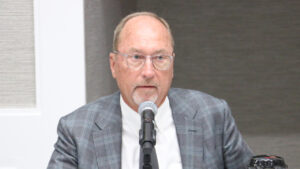
While touting the casino’s employment and amenities, proponents have also pointed to casino developers’ plan to give 8% in annual net gaming revenue – the highest percentage in the state – to fund local nonprofits. Iowa law mandates that regulated licensed casinos set aside a minimum percentage of revenue to fund nonprofit organizations.
The COVID-19 pandemic and derecho have put more financial stress on local nonprofits, and LCGA president Anne Parmley has said contributions from a casino will provide a much-needed source of funding to assist Linn County in managing future needs.
“From the beginning, we’ve said a Linn County casino will help our communities be more vibrant places to live,” Ms. Parmley said. “We believe we can do more and be more – and the $5 to $7 million dollars in annual net gaming revenue that we can commit to funding local nonprofits is our way to show our commitment to lifting Linn County as a better place to live, work and visit.”
However, several casino operators, particularly the Riverside Casino and the Isle Casino in Waterloo, have argued that a new competitor in Cedar Rapids would dramatically curtail their revenues, forcing layoffs and reducing their contributions to nonprofit organizations in their respective areas.
In addition, a Des Moines-based group launched a campaign in November against the effort to obtain a Cedar Rapids casino license.
Iowans for Common Sense, which billed itself as “a grassroots coalition dedicated to preserving the integrity of Iowa’s communities,” called on area residents to stand against the push for a new casino in Cedar Rapids.
“The message from Iowans is clear,” Iowans for Common Sense spokesperson Zachary Harnden said. “People across the state value what our current casinos bring to their communities but do not support further expansion. Cedar Rapids residents, in particular, are firmly opposed, and we’re here to support them in amplifying their voices.”
The group claimed that a study conducted by UpONE Insights, an Arlington, Virginia-based polling and research firm, indicates that while a majority of Iowans are in favor of casino gambling in the state overall, two-thirds of Iowa residents oppose new casinos, and 53% of Cedar Rapids residents are against a new casino in Cedar Rapids.
The study, which UpONE indicated was based on a random telephone survey of 500 Iowa residents in September, also asserted that 56% of voters across Iowa support a moratorium on further casino expansion.
Casino proponents claimed the group was largely financially supported by the state’s existing casinos, especially Riverside Casino.




